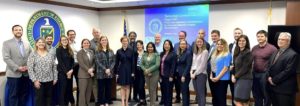
Cradle to Commerce offers comprehensive entrepreneurship support services to Lab scientists, including matching with public and private sector entrepreneurs and partners
Moving critical clean energy technology solutions from the lab to the marketplace is an important part of the DOE’s mission, but also a challenging endeavor. Researchers who invent a new technology may not have a good understanding of marketplace needs, or they may not have the business skills to communicate their ideas to industry partners or start a company, or they may lack funding or access to facilities, among other challenges.
According to U.S. Secretary of Energy Jennifer M. Granholm, “Accelerating how quickly we get novel technologies to the marketplace will allow us to deploy the clean energy sources needed to combat climate change, lower energy costs, and keep us on course to reaching President Biden’s decarbonization goals.”
Carol Burns, the Lab’s Deputy Director for Research, said, “I have seen so many creative, promising solutions to address the world’s climate and energy challenges at the Lab, solutions that need to be commercialized to have a real impact. Deepening the knowledge of technology maturation and transfer among lab researchers and entrepreneurs will be critical to DOE’s success.”
In the spring of 2022, the DOE’s Office of Technology Transitions (OTT) directed its Technology Commercialization Fund call for proposals to the technology transfer process, rather than towards specific technology areas, as is its usual practice. National labs were encouraged to collaborate on proposals. Berkeley Lab submitted five proposals (we led two of the proposals, and were subs on three proposals); in July, OTT announced the winners, including one on which the Energy Technologies Area (ETA)’s Reshma Singh (the principal investigator for the project) and the Intellectual Property Office (IPO)’s Shanshan Li collaborated. The award was the largest TCF award to date to develop infrastructure for clean energy technology commercialization at the national labs.
The “Cradle to Commerce (C2C)” proposal, as it was named, includes the key components needed to accelerate the commercialization of energy-related technologies, with an objective to enable climate action. These include ensuring alignment with industry needs, identifying high potential national lab intellectual property (IP) that could enable climate impact, providing entrepreneurship training, and matching Lab IP and entrepreneurs with external partners. Program partners include three national labs (Argonne National Laboratory, Idaho National Laboratory, and Oakridge National Laboratory) and external incubator partner organizations (OneValley, Decisive Point, and The Engine by MIT).
Jesse Kindra, the Lab’s Chief Technology Transfer Officer, said, “I was very impressed with how Reshma and Shanshan rolled up their sleeves to put together a creative and strategic proposal. It took a lot of hard work and the scope and potential impact of the proposal excited the selection panel, which included representatives from the participating DOE program offices.”
Reshma and Shanshan discussed the winning proposal and the C2C program that is being launched this month.
What was significant about this TCF call for proposals?
Reshma: Climate action is urgent, and it is critical that science-validated tech solutions developed at the national labs are rapidly brought to the marketplace as aviable options. The DOE is making significant investments to accelerate bringing lab innovations to the market, from Innovation Corps (I-Corps) training and IMPEL to Lab-Embedded Entrepreneurship Programs (LEEP), of which Berkeley Lab’s Cyclotron Road was the first. However, C2C is the most comprehensive program to date, offering matchmaking between four national labs—including these labs’ IP, facilities, and mentors—and the private sector.
Shanshan: Traditionally, the TCF award has supported the commercialization of specific types of technologies. This is the first time OTT has issued a call for bold ideas to build national labs’ infrastructure for commercializing technologies.
We are lucky to be the prime lab for this program. It is one of the DOE’s biggest investments in entrepreneurship; the funding will help many national lab entrepreneurial teams get off the ground and get the training and support they need.
What are you trying to achieve with this project?
Reshma: We hope that the C2C program will help harness climate and energy technologies from Berkeley Lab and our partner national labs, to bring to the marketplace climate solutions at the system level. The program aims to recruit its program participants and partners from underrepresented communities. We want to do so in tight collaboration with our private sector partners – The Engine at MIT, OneValley, and Decisive Point. We believe that through our collaboration, C2C will help address climate change, create clean jobs, and craft a future which is more equitable for the entire population.
Why did you decide to collaborate on this proposal?
Shanshan: I met Reshma many years ago through a patent we filed on her two inventions – for a building energy management device, and for a solar powered vaccine refrigerator. When she founded the IMPEL tech-to-market program, I saw firsthand its impressive reach and impact. When the TCF call came out, she offered a concept that had great potential. I started working with Reshma to provide technology transfer expertise to her proposal, to ensure that the proposal was aligned with the call.
Reshma: When we select entrepreneurial teams at IMPEL, we look for drive, attitude, and personal passion. Shanshan’s dedication was impressive, even when we first met. So when she reached out to offer support, I seized the opportunity. We balance each other out; together we can offer vision and passion as well as a strong set of skills.
What will the collaboration with the other Labs accomplish?
Reshma: Each partner lab, in collaboration with the private sector partners, will develop the IP curation and strategy for each of the program’s domain areas: smart grid, buildings, renewable energy and storage, and nuclear energy. And, having multiple national labs in the program will allow us to tap into an unprecedented set of assets, from IP to scientists to user facilities and test beds. We also hope that this broad participation will help ensure adoption of new entrepreneurial culture and infrastructure at the national labs that we hope to develop through C2C.
Shanshan: For external investors and corporate partners, the DOE complex is not easy to navigate. With four national labs participating in this program, we will create a central portal for industry to identify and pursue startup opportunities with these national labs. We will help prescreen the technologies with high commercial potential and connect external partners with national lab assets and expertise in clean energy.
What do you want researchers to know about this project?
Reshma: We are looking for people who are interested in entrepreneurship, even if they don’t themselves have an invention. Startups require innovative technologies and funding, but also business skills and connections, to bring these technologies to market. More than half of the budget will provide funding support so that researchers can devote time to their startups and access experts, facilities, space, and prototyping resources. Interested researchers and staff should contact Shanshan or myself.
Shanshan: This program is a unique opportunity to build an ecosystem at national labs to support entrepreneurship. Fish can’t live without water. Would-be entrepreneurs can’t thrive without the necessary infrastructure to support them. This program will help entrepreneurial-minded researchers get their feet wet and test the waters of entrepreneurship.
What are you most excited about?
Reshma: I’m excited for kickoff! We will be seeking interested entrepreneurs at the participating national labs as well as through ourprivate partners.It will be thrilling to see these partnerships crystallize to bring great innovations to the market.
The C2C team will host an informational webinar this fall about “Cradle to Commerce” opportunities. Look for details in Elements.

Award winners from the national labs and the DOE program officers at the Tech Commercialization Fund kickoff meeting on Nov. 1, 2022

